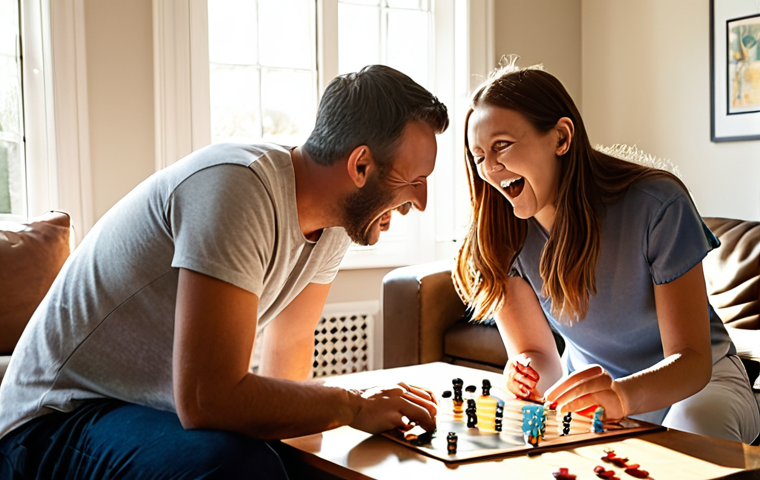In our hyper-connected world, ironically, many feel increasingly isolated. The constant barrage of notifications, the endless scrolling, and the pressure to maintain a perfect online persona can leave us feeling drained and disconnected from genuine human interaction.
I’ve noticed in my own life and in conversations with friends, the need to step back and intentionally reconnect with the real world and the people in it is more vital than ever.
It’s about finding balance, reclaiming our time, and nurturing relationships that truly matter. The digital world is fantastic but isn’t everything. Let’s explore this in more detail below.
Reclaiming Face-to-Face Interactions in a Digital Age

Let’s be honest, how many times have you been out with friends, only to find everyone glued to their phones? I’ve been there, and it’s frustrating! We’re physically present, but mentally elsewhere. It’s like we’re missing out on the actual experience and connection. I’ve started implementing a “no phones at the table” rule during meals with my close friends, and the difference in our interactions is remarkable. We actually talk, listen, and engage with each other. It’s a conscious effort, but the payoff in terms of deeper connections is worth it. It reminds me of the pre-smartphone era when conversations flowed freely without the constant interruptions of notifications. We need to intentionally create spaces where real human interaction can thrive.
Scheduling Unplugged Time with Loved Ones
One thing that has helped me is to literally schedule “unplugged time” with my family. Every Sunday afternoon, we put our phones away and do something together – whether it’s playing board games, going for a hike, or just chatting over tea. It’s amazing how much closer we feel after just a few hours of undivided attention. It’s about being fully present and engaged in the moment, without the distraction of technology. Think about it: When was the last time you truly listened to what your friend or family member was saying, without being tempted to check your phone? These dedicated periods create space for spontaneous conversations, shared laughter, and genuine connection. For us, it’s become a cherished ritual that reinforces our bond and creates lasting memories.
Prioritizing Quality over Quantity in Online Interactions
We often equate online interactions with staying connected, but is that truly the case? I’ve realized that having hundreds of “friends” on social media doesn’t necessarily translate to meaningful relationships. It’s better to focus on nurturing a smaller circle of genuine connections. Instead of mindlessly scrolling through feeds, I now make an effort to engage in meaningful conversations with the people who matter most to me. This might mean sending a thoughtful message to a friend, commenting on a post with genuine interest, or even scheduling a virtual coffee date to catch up. It’s about shifting our focus from quantity to quality in our online interactions, ensuring that they contribute to our overall well-being and strengthen our relationships.
Cultivating Mindfulness to Combat Digital Overload
I’ve found that practicing mindfulness has been incredibly helpful in managing the constant influx of information and stimulation from the digital world. Taking just a few minutes each day to meditate or practice deep breathing can make a huge difference in my ability to stay present and focused. When I feel overwhelmed by notifications or the urge to constantly check my phone, I try to pause and simply observe my thoughts and feelings without judgment. This helps me to detach from the digital world and reconnect with myself. I also try to incorporate mindfulness into my daily activities, such as paying attention to the taste and texture of my food while eating, or noticing the sensations in my body while walking. These small practices can help to ground me in the present moment and reduce the stress and anxiety associated with digital overload.
Establishing Tech-Free Zones in Your Home
Creating tech-free zones in my home has been a game-changer. For instance, my bedroom is a designated “no-phone zone.” This means no scrolling through social media before bed or first thing in the morning. It’s amazing how much better I sleep and how much more relaxed I feel when I disconnect from technology in my bedroom. I also have a “no-tech zone” in my dining room, where we can enjoy meals together without any digital distractions. These designated spaces allow us to disconnect from the digital world and reconnect with ourselves and our loved ones. It’s about creating physical boundaries that support our mental and emotional well-being.
Practicing Gratitude for the Present Moment
One simple but powerful technique I’ve been using is practicing gratitude. Before reaching for my phone, I take a moment to appreciate the present moment. It could be something as simple as the warmth of the sun on my skin, the taste of my morning coffee, or the sound of birds chirping outside my window. Focusing on these small joys helps me to shift my attention away from the digital world and appreciate the beauty and richness of my surroundings. I also keep a gratitude journal where I write down a few things I’m grateful for each day. This helps me to cultivate a more positive mindset and appreciate the good things in my life, which in turn reduces my reliance on technology for validation and entertainment.
Rediscovering Hobbies and Passions Outside the Digital Realm
Think back to what you enjoyed doing before smartphones became ubiquitous. Did you love painting, playing a musical instrument, or hiking in nature? I realized I had completely neglected my passion for photography, so I dusted off my old camera and started exploring my neighborhood with a renewed sense of curiosity. It’s been incredibly rewarding to reconnect with this creative outlet and discover new perspectives on the world around me. Rediscovering hobbies and passions outside the digital realm is a fantastic way to reduce screen time and engage in activities that bring us joy and fulfillment. It’s about finding activities that challenge us, inspire us, and allow us to express ourselves creatively.
Joining a Local Community Group or Club
I recently joined a local book club, and it’s been a fantastic way to meet new people and engage in stimulating conversations. We meet once a month to discuss a chosen book, and it’s always a lively and thought-provoking experience. It’s a great way to expand my horizons, learn new perspectives, and connect with others who share my love of reading. Joining a community group or club is a wonderful way to build social connections and engage in activities that align with our interests. Whether it’s a hiking club, a knitting circle, or a volunteer organization, there are countless opportunities to connect with like-minded individuals and make a positive impact on our community.
Volunteering Your Time to a Cause You Care About
There’s something incredibly fulfilling about giving back to our community. I started volunteering at a local animal shelter, and it’s been an incredibly rewarding experience. I get to spend time with adorable animals, help them find loving homes, and make a difference in their lives. Volunteering is a fantastic way to connect with others, contribute to a meaningful cause, and experience the joy of giving back. It’s about shifting our focus from ourselves to others and making a positive impact on the world around us. Plus, it’s a great way to meet new people who share our values and interests.
Breaking Free from the Comparison Trap on Social Media
Social media can be a breeding ground for comparison. We’re constantly bombarded with images of seemingly perfect lives, which can lead to feelings of inadequacy and dissatisfaction. I’ve definitely fallen into the trap of comparing myself to others online, and it’s never a pleasant experience. It’s important to remember that what we see on social media is often a curated version of reality, not an accurate reflection of someone’s entire life. People tend to highlight their successes and downplay their struggles, which can create a distorted perception of their lives. It’s crucial to be mindful of this and avoid comparing ourselves to others online. Instead, focus on our own journey, celebrate our own accomplishments, and appreciate the unique qualities that make us who we are.
Unfollowing Accounts That Trigger Negative Emotions
I’ve made a conscious effort to unfollow accounts that trigger negative emotions or make me feel inadequate. This might include accounts that showcase unrealistic beauty standards, boast about extravagant lifestyles, or promote negativity and drama. It’s about curating my social media feed to reflect my values and support my well-being. I now follow accounts that inspire me, educate me, and make me feel good about myself. This might include accounts that promote self-care, mindfulness, creativity, or positive social change. It’s about creating a social media environment that supports our mental and emotional health.
Focusing on Your Own Journey and Accomplishments
Instead of comparing myself to others, I now try to focus on my own journey and accomplishments. I celebrate my successes, learn from my mistakes, and appreciate the progress I’ve made along the way. It’s about recognizing that everyone’s path is unique and that there’s no need to compare ourselves to others. I also try to focus on my strengths and talents, and use them to pursue my goals and passions. This helps me to feel more confident and empowered, and less likely to fall into the comparison trap. It’s about embracing our individuality and celebrating our own unique gifts.
Setting Boundaries with Technology: A Practical Guide
Okay, so we know why it’s important to set boundaries, but how do we actually do it? For me, it started with small, manageable changes. I began by turning off notifications for non-essential apps, which significantly reduced the urge to constantly check my phone. Then, I designated specific times for checking emails and social media, rather than letting them dictate my schedule. Another helpful strategy is to charge your phone outside of your bedroom to avoid the temptation of scrolling before bed or first thing in the morning. It’s about consciously creating space between yourself and technology, and regaining control over your time and attention.
Using Apps and Tools to Monitor Your Screen Time
There are a plethora of apps and tools available that can help you monitor your screen time and set usage limits. I’ve been using the built-in screen time feature on my iPhone, and it’s been incredibly helpful in tracking my usage patterns and identifying areas where I can cut back. You can also set daily time limits for specific apps, which can be a great way to break free from mindless scrolling. Experiment with different apps and tools to find what works best for you, and don’t be afraid to adjust your settings as needed. The goal is to gain awareness of your technology usage and make informed choices about how you spend your time.
Communicating Your Boundaries to Others
Setting boundaries with technology isn’t just about individual habits; it’s also about communicating those boundaries to others. Let your friends and family know that you’re trying to reduce your screen time and that you might not be as responsive to messages or emails as you used to be. It’s also important to be respectful of other people’s boundaries. If someone tells you they’re not available to chat or that they need to disconnect from technology, honor their request and avoid pressuring them to engage. Clear communication is key to ensuring that everyone feels respected and supported in their efforts to create a healthier relationship with technology.
The Benefits of Unplugging: A Table of Tangible Outcomes
I’ve noticed some real, concrete improvements in my life since I started being more intentional about unplugging. I wanted to share this in a way that’s easy to understand.
| Area of Life | Benefits of Unplugging |
|---|---|
| Relationships | Deeper connections, improved communication, increased empathy |
| Mental Health | Reduced stress and anxiety, improved mood, enhanced focus and concentration |
| Physical Health | Better sleep, increased energy levels, reduced eye strain |
| Creativity | Increased inspiration, enhanced problem-solving skills, greater sense of flow |
| Productivity | Improved time management, increased efficiency, reduced procrastination |
Embracing Imperfection and Finding Joy in the Present Moment
One of the biggest lessons I’ve learned is that it’s okay not to be perfect. We live in a culture that often glorifies achievement and success, which can create a lot of pressure to constantly strive for more. But I’ve realized that true happiness comes from embracing imperfection and finding joy in the present moment. It’s about accepting ourselves for who we are, flaws and all, and appreciating the simple things in life. This might mean letting go of the need to constantly check our phones, compare ourselves to others, or strive for unattainable goals. It’s about focusing on what truly matters – our relationships, our well-being, and our connection to the world around us.
Prioritizing Self-Care and Nurturing Your Inner Child
I’ve made self-care a non-negotiable part of my daily routine. This might include taking a long bath, reading a good book, going for a walk in nature, or spending time with loved ones. It’s about doing things that nourish my mind, body, and soul. I also try to connect with my inner child by engaging in activities that bring me joy and playfulness. This might include coloring, playing games, or simply laughing and being silly. It’s about remembering what it felt like to be carefree and uninhibited, and bringing that sense of joy and wonder into my adult life.
Finding Meaning and Purpose Beyond the Digital World
Ultimately, the goal is to find meaning and purpose beyond the digital world. This might involve pursuing our passions, connecting with our community, or making a positive impact on the world. It’s about discovering what truly matters to us and aligning our lives with our values. I’ve found that when I’m engaged in activities that are meaningful and fulfilling, I’m less likely to rely on technology for validation and entertainment. It’s about creating a life that is rich, vibrant, and full of purpose – a life that extends far beyond the confines of our screens.
Reclaiming our lives from the digital deluge isn’t about abandoning technology altogether; it’s about finding a balance, a way to use these tools consciously and intentionally, rather than being used by them.
It’s about rediscovering the richness of the world around us, the depth of human connection, and the simple joys of the present moment. Let’s prioritize real life, one unplugged moment at a time.
In Closing
Taking a step back from our screens isn’t about complete digital detox. It’s about intentionally creating space for genuine experiences and meaningful connections. Let’s strive for a balanced approach, using technology as a tool rather than letting it consume our lives. Here’s to reclaiming our time, our relationships, and our well-being in this ever-connected world.
Useful Information to Know
1. Local Community Events: Check community centers, libraries, and local websites for events like book clubs, workshops, and volunteer opportunities in your area.
2. Mindfulness Apps: Explore apps like Headspace or Calm for guided meditations and mindfulness exercises that can help you stay grounded and reduce stress.
3. Screen Time Monitoring Tools: Utilize built-in features on your smartphone (like Screen Time on iOS or Digital Wellbeing on Android) to track your usage and set limits.
4. Blue Light Filters: Consider using blue light filters on your devices or wearing blue light-blocking glasses to reduce eye strain and improve sleep quality.
5. Outdoor Activities: Find local parks, trails, or recreational areas where you can spend time in nature, whether it’s hiking, biking, or simply relaxing.
Key Takeaways
* Prioritize face-to-face interactions: Make a conscious effort to engage in real-life conversations and activities with loved ones.
* Cultivate mindfulness: Practice mindfulness techniques to manage digital overload and stay present.
* Rediscover hobbies: Reconnect with passions outside the digital realm to find joy and fulfillment.
* Break free from comparison: Focus on your own journey and avoid comparing yourself to others on social media.
* Set boundaries with technology: Establish clear rules for your technology usage and communicate them to others.
Frequently Asked Questions (FAQ) 📖
Q: What are some practical ways to disconnect from the digital world and reconnect with reality?
A: Honestly, it’s tougher than it sounds, right? But I’ve found a few things that help. First, setting designated “phone-free” times – like during dinner or an hour before bed – makes a huge difference.
Actually putting my phone in another room helps eliminate temptation, too. Instead of scrolling, I’ll read a physical book or just chat with my family.
Also, actively planning activities that don’t involve screens – going for a hike, meeting friends for coffee, volunteering – really helps shift my focus.
I signed up for a pottery class. It’s messy, imperfect, and requires my full attention.
Q: How can I tell if my online presence is affecting my mental health and relationships?
A: This is tricky because it can creep up on you. But think about these things: Do you feel anxious or stressed when you don’t have your phone on you? Do you compare yourself to others online and feel inadequate?
Are you spending more time engaging online than you are with the people you care about? If you answered yes to any of these, it’s probably time to re-evaluate your relationship with social media.
I noticed I was getting really snippy with my husband after spending hours scrolling through Instagram and feeling like my life was somehow “less than” others.
That was a big wake-up call. A friend of mine deactivated her account for a month and said it was like a weight had been lifted.
Q: What advice would you give to someone struggling to find a balance between their digital life and their real-world connections?
A: Be kind to yourself! It’s a process, not a switch you can just flip. Start small, and celebrate your wins.
Don’t aim for perfection; aim for progress. Also, be honest with yourself about why you’re using social media. Are you truly connecting with people, or are you just seeking validation?
Try unfollowing accounts that make you feel bad about yourself and follow ones that inspire you or make you laugh. And most importantly, remember that your real-world relationships are the ones that truly matter.
A heartfelt conversation over a cup of coffee is always going to be more fulfilling than a fleeting online interaction. I actually schedule “coffee dates” with my friends now; it sounds cheesy, but it works!
📚 References
Wikipedia Encyclopedia
구글 검색 결과
구글 검색 결과
구글 검색 결과
구글 검색 결과
구글 검색 결과






